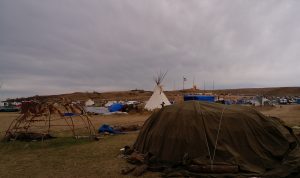I knew of the DAPL desecration of ancient graves and brutal attacks on unarmed water protectors; the ramped-up arrests by the Morton County sheriff’s officers; the lies being spread through the local media about the resistance to the pipeline. I knew of the paramilitary equipment that was showing up against the front-line water protectors’ actions. But nothing could have prepared me for the shock of seeing the steady parade of law-enforcement vehicles on Rt. 1806 past the camp, or the surveillance helicopters and planes that circled many times each day. It was clear: this camp was at the border of a conflict zone; a psy-ops campaign was underway to wear the people down.
It is a strange feeling, being a white middle-class woman, a clicktivist, letter-writer, and subtle activist but not a direct-action protestor, walking into such a situation: the adrenaline immediately starts to flow, the nervous system goes on hyper-alert, and the slightest thing can seem to be a danger signal. I was awed at these people, survivors of 500+ years of attempted genocide, who lived day-in, day-out under the strain, strong, watchful, and outwardly cheerful, with a constant thread of ceremony weaving through their life together. walking peacefully to stand in the face of the paramilitary forces that seek to destroy their land, culture, and sacred places.
Still, it didn’t take long to start hearing warnings and rumors. I’d just set up my tent and come down to the central drum circle to hear Dennis Banks, co-founder of the American Indian Movement, welcome a busload of middle-school students from Duluth, MN, when a woman hurried up: “Have you heard? They’re saying the governor’s going to call in the National Guard to evict us all, any day now.” Mark Lesser, the firekeeper who had helped me put up my tent on the first day, pooh-poohed the rumor when I asked him a little later. “That’s been going around the camp for months. This land is off reservation territory,” he told me. “According to treaty, it still belongs to the Standing Rock Nation. However, it’s Army Corps of Engineers land, and yes, any of us could be arrested for camping here. If you want to be safe, you should go and camp at Sacred Stone, that’s private land.”
I chose to stay, but took the lesson: live lightly, set priorities, be ready in case of eviction. Everything except the barest necessities stayed in the car. The phone stayed with me at all times unless it was charging at the solar station at the top of Facebook Hill.
The real wake-up moment came as I was standing at that charging station at the highest point in the camp, hearing the buzz of a DAPL airplane overhead as I talked with NoDAPL activist Deborah Gaudet of New Mexico. Nearby, journalists interviewed Dennis Banks, and security guards rode past on horseback, surveying the camp perimeter. In that charged moment of communication and watchfulness, shortly after I’d learned of the eviction risk, I saw the bright yellow of a front-end loader rolling past the security station and into the camp.
Had it begun already? A black SUV followed the heavy equipment, and I thought of the unmarked black vehicles that had accompanied the police cars on their last pass. What to do? Frantically weighing options, I gave increasingly distracted responses to Deborah, until she made her farewells and moved away. I headed downhill for the security station.
The young guard there – Larry, who had greeted me on my arrival – smiled easily as I approached. No sign of alarm there. Feeling rather foolish, I stammered, “I, er, saw some heavy equipment coming into the camp just now…ummm, is everything OK?”
He glanced down the central avenue, lined with the flags of the nations represented in camp, and nodded. “Oh, that’s just to help with building the yurts for the elders,” he said. “The building materials arrived a while ago and we’re getting ready to level the ground to put them up.”
I breathed a sigh of relief. “I’m so glad,” I said. “I’d just heard that the National Guard might be coming to evict us all in the next day or so.”

He frowned. “You’ll hear stories like that all the time. The police and DAPL are trying to scare us, put us off our balance. Don’t let it disturb you. After all, what’s the worst that could happen? You’d go in spirit to see your relatives. Don’t let them shake your prayers. Stay in prayer, sister.” He smiled reassuringly, held out his arms and gave me a big hug; I smiled at him in gratitude.
It was the first of many times I would be reminded of the source of this camp’s heroic strength.